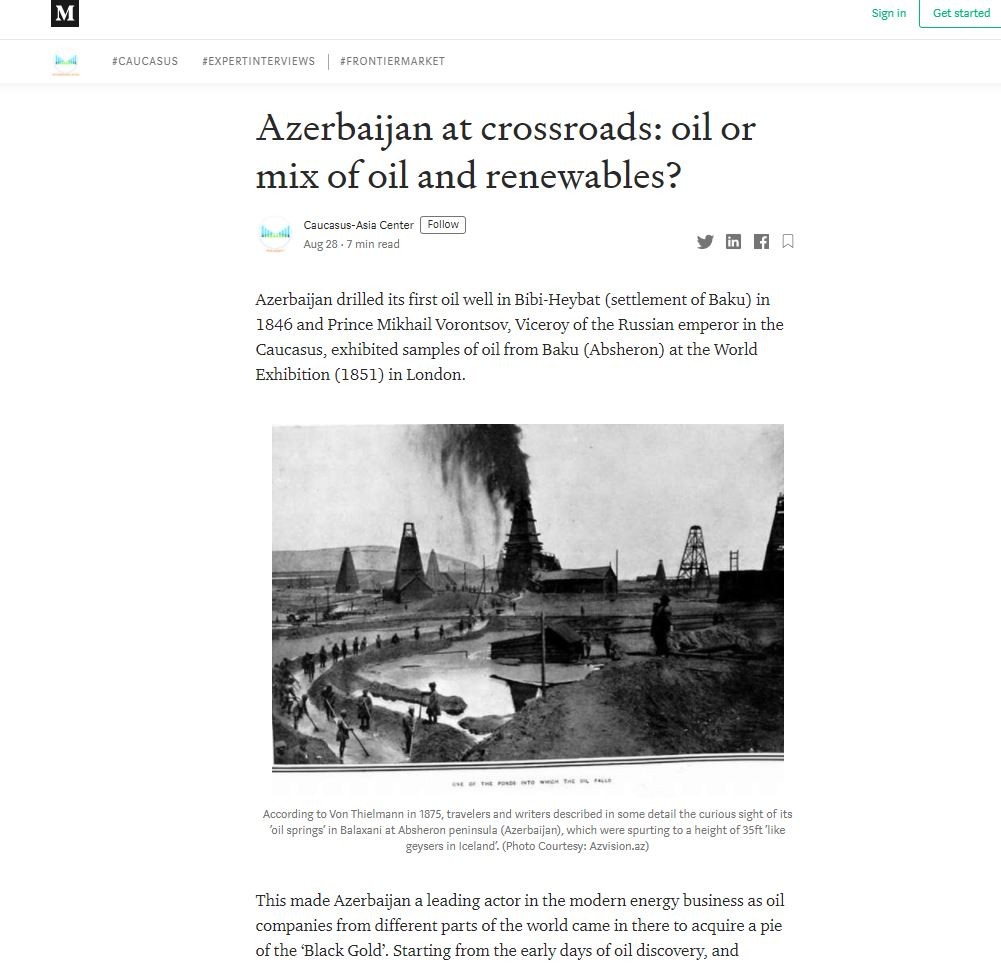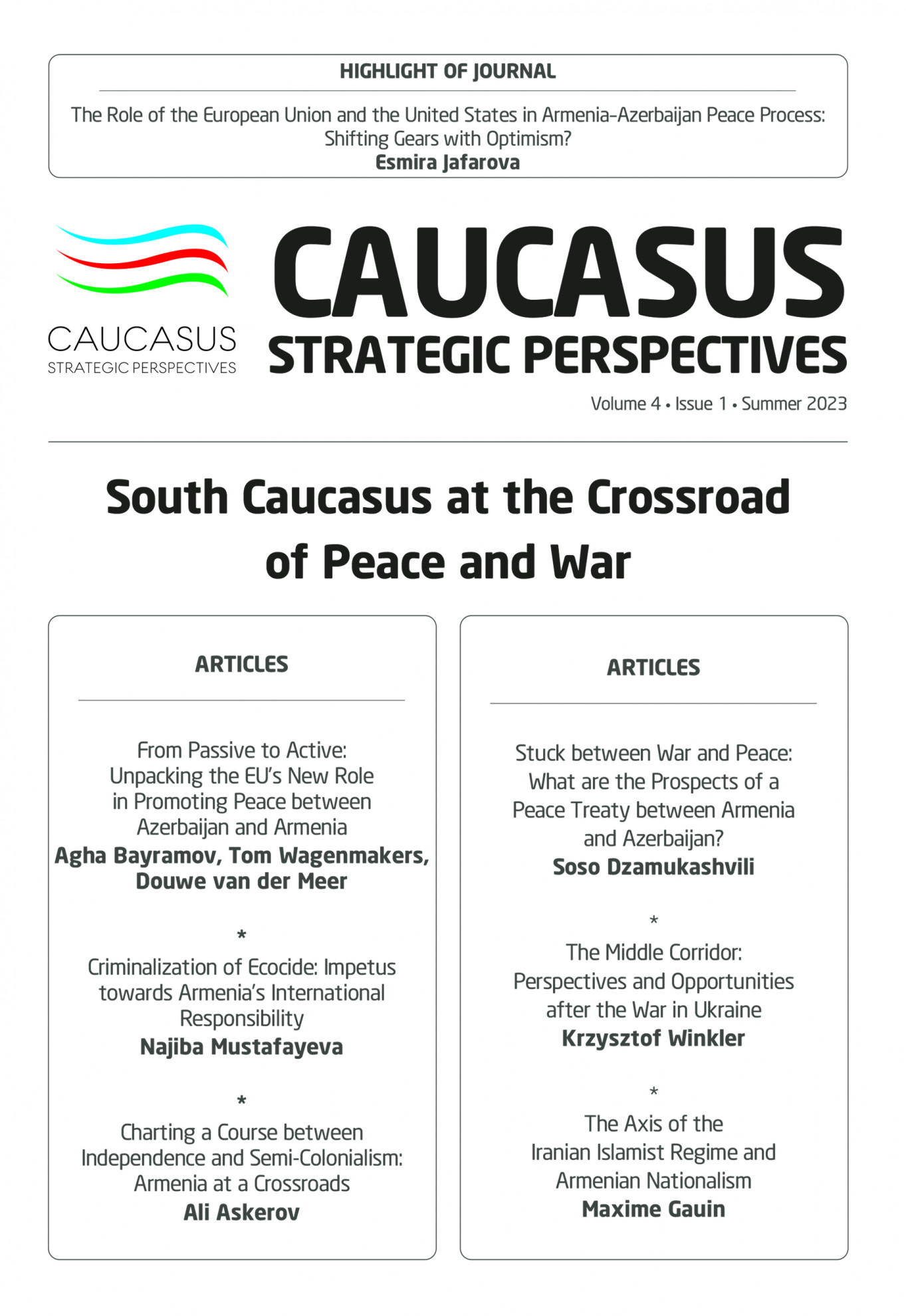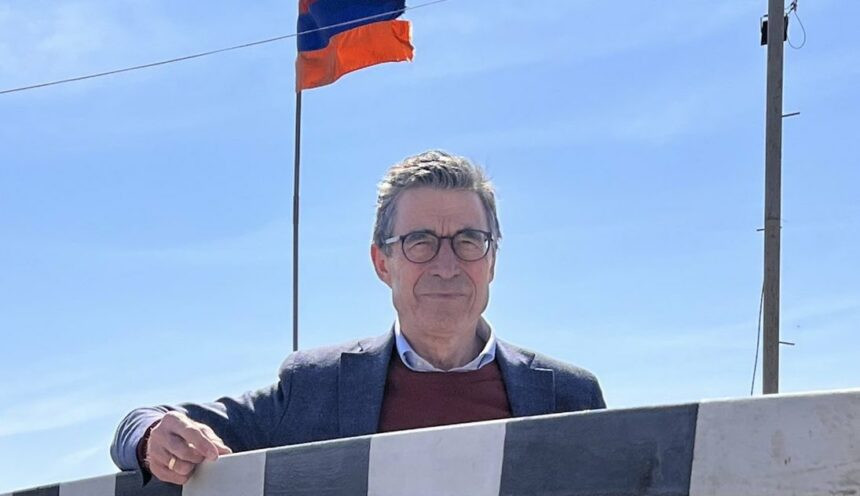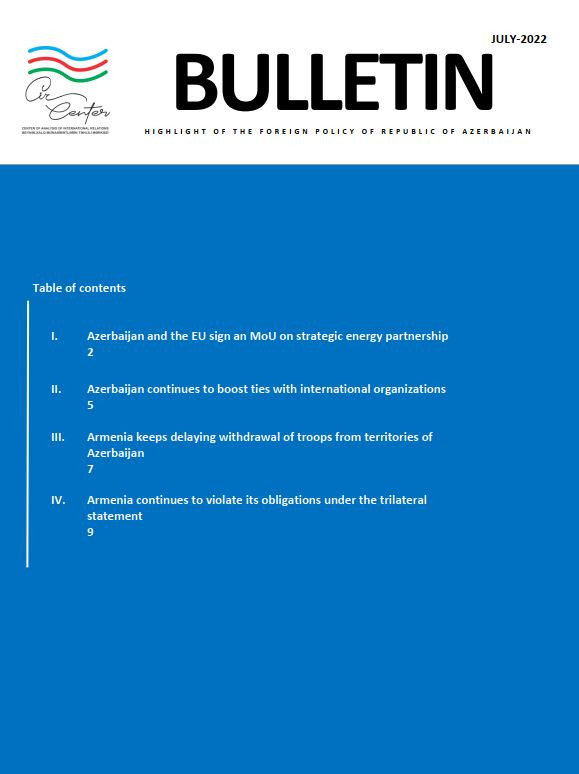Azerbaijan drilled its first oil well in Bibi-Heybat (settlement of Baku) in 1846 and Prince Mikhail Vorontsov, Viceroy of the Russian emperor in the Caucasus, exhibited samples of oil from Baku (Absheron) at the World Exhibition (1851) in London.
This made Azerbaijan a leading actor in the modern energy business as oil companies from different parts of the world came in there to acquire a pie of the ‘Black Gold’. Starting from the early days of oil discovery, and especially in the second half of the 19th and early 20th centuries, a number of foreign companies successfully operated there and ensured the production of oil. Though the oil industry suffered to a certain degree during the Soviet times, however, it soon got an overhaul after the country became independent in 1991. The “Contract of the Century” signed between SOCAR and the Western Consortium, at the Gulistan Palace in Baku, September 20, 1994, undoubtedly was a milestone and a turnaround event for re-positioning Azerbaijan as among the oil majors in the world in the post-Cold War era.
However, oil related investments have brought with it various complications in the country. This has created a fossil dependent economy that is acutely prone to fluctuation in global oil prices. Also, this has built “developed enclaves” surrounding few metro cities, such as Baku and Ganja, whereas vast regions of the country has remained poor. In recent times as the global oil prices have entered a bear run, starting with the 2014 oil glut that has continued and further accelerated in the present pandemic, the Azerbaijan government has started working towards diversification of the economy and decreasing the country’s dependence on petro-dollars (fossil revenues).
The Caucasus-Asia Center had an opportunity to interview prominent expert in the country, Orkhan Baghirov. He has an academic background in economics, and conducts researches on issues related to (energy)-trade and transportation. Mr. Baghirov is presently working as a Leading Advisor with the Center of Analysis of International Relations (AIR Center), a newly created think tank with support of the government of Azerbaijan. He previously worked with various reputed institutions, including now defunct Center for Strategic Studies under the President of the Republic of Azerbaijan (SAM). Following are his personal thoughts on how he sees the state of affairs of the energy industry in the country and how the economy is re-adjusting to the present oil price shock that falls in a completely new kind.
Question 1. How do you see the recent bust in global oil price, and especially at the West Texas Intermediate (WTI)? Do you think this has greatly affected the fossil industry and the fossil-based system at the world stage, or this will be fade away as yet another oil price shock, like the one in 1973?
Answer: In recent decades we have witnessed considerable development of renewable energy sector. The main reason behind this development was the sensitivity of fossil industry and economies of hydrocarbon-dependent countries to the market prices of fossil fuels. The countries that depend on export of hydrocarbons and the countries that import hydroccarbons put a lot of efforts in development of renewable energy sources in order to decrease their dependence on fossil fuels. Besides, fluctuations in the price of hydrocarbons became a political tool to influence the countries that depend on their import. Recent COVID-19 related economic problems once again proved the sensitivity of fossil industry and negative implications of this sensitivity.
Therefore, in my opinion recent bust in global oil price will accelerate the development of renewable energy sector and countries will work on new strategies to increase the share of renewable energy sources. Along with this process the hydrocarbon-dependent countries will put great attention on development of non- hydrocarbon sector. However, if we take in account that we still need time to considerably decrease the dependence of the world economy on fossil fuels current fluctuations in the fossil fuel prices will be fade away as other oil shock, but will accelerate development of renewable energy sources.
Question 2. We see, big oil companies, and especially BP, have been involved with developing new projects and scaling up capacities of existing oil and gas fields in Azerbaijan. Under present scenario when COVID-19 has affected almost all countries and has brought the world economy to a standstill, how do you see the oil projects in your country advancing now that the situation is steadily beginning to normalize?
Answer: It seems that BP’s activities in Azerbaijan — the ongoing projects and planned exploration and developments has not been affected by COVID 19. The ongoing projects such as Shah Deniz passes 1 & 2 are producing natural gas and moreover has been increasing gas production and export from the stage 2. The oil industry has been impacted by the situation with falling demand and low prices in the global oil market. However, ACG oil field development is continuing as usual and BP and other partners are continuing their CAPEX and OPEX to maintain the production. As per the planned projects, which are on the stage of exploration such as the Shafag-Asiman gas project, and oil exploration in the shallow waters of the sea, it seems that they are still on track and nothing has been changed with future plans as no such an announcement was made by the government and the BP.
Question 3. What are the policies and activities the Azerbaijan government has been pursuing in recent years to make its oil industry par excellence to other technology-based sectors of the global economy?
We are living in the energy transition era and developing the energy industry by strategic approach to applying emerging technology is the priority issue for many governments including the government of Azerbaijan in order not to become an outsider in a decade or so. In this regards the energy sector is competing not only with other global technology-based industry but there is a great competition within the energy sector itself. The Azerbaijan government adopted several programs and roadmaps to develop the energy sector by applying emerging technology to produce green/clean energy, to increase energy efficiency and to digitalize the sector.
Question 4. How do see Azerbaijan’s attempts towards diversification of its national economy and away from excessive dependence on oil and gas?
Answer: In recent years, especially after the 2015, when the oil prices have significantly decreased Azerbaijan changed its economic policy towards the diversification of its economy by developing non-oil sector. In order to successfully implement this strategy in 2016 the Azerbaijan government adopted Strategic Road Map covering national economic perspectives and strategic road maps on 11 economic sectors consists of 12 documents. Besides, Azerbaijan implemented different transport projects which are also positively affect the development of the non-oil sector. As a result of taken measures towards the development of non-oil sector between 2008–2019 years the share of non-oil sector in GDP increased from 38% to 55%.
Question 5. Many experts have claimed that the outbreak of pandemic and cheap oil will reverse the euphoria over renewable energies and delay the transition towards alternative energies? Do you agree to this, or how do you feel transition dynamics will unfold in the coming time?
Answer: I do not agree with the idea that the pandemic and cheap oil will delay the transition towards the alternative energies. On the contrary, pandemic related problems will accelerate the development of renewable energy sector as the outbreak of pandemic once again proved the sensitivity of hydrocarbon-based energy sector on price fluctuations. Despite the fact that pandemic created opportunity for some countries to buy cheap oil significant decrease in the economic activity during the pandemic did not let them to take full advantage of cheap oil. As the pandemic will fade away and the global demand for the hydrocarbons will recover it will again encourage the development of renewable energy sector.
Question 6. Can you share with us some of the endeavors/ initiatives of Azerbaijan government towards positioning the country at the crossroads of Eurasian transportation corridors, such as INSTC, BRI and Middle Corridor?
Answer: In recent years Azerbaijan actively participated in and initiated different transportation projects in order to transform itself to the regional transportation hub.
In 2017, Azerbaijan inaugurated Baku-Tbilisi-Kars railway (BTK) which have been considered by regional states as a continuation of BRI. BTK enables to transport the cargos from China to Europe in 12 days which is the shortest route compare to the sea route which takes 36 days to transport cargos in east-west direction. Another important transportation project is the Baku International Sea Trade Port which inaugurated in 2018 on the Caspian Sea. After full completion of construction, the trade port will become the biggest port in the Caspian Sea. These projects transformed the Azerbaijan to one of the main players in BRI and INSTC.
Azerbaijan also aims to become a regional digital hub by participating in digital version of BRI called “Digital Silk Road” project. Recently, Azerbaijan inaugurated two fiber-optic cables with Kazakhstan and Turkmenistan that will lay through the bottom of the Caspian Sea. Actively participating in “Digital Silk Road” project Azerbaijan will become a regional cyber-services center not only for the South Caucasus but also more widely, for the Middle East, Central Asia and South Asia.








